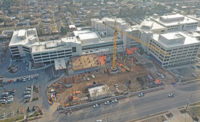Specialty contractors in the Mountain States continue to find ample work with improving margins, but familiar maladies remain. “The construction market for 2016 in Utah is very positive,” says Jim Laub, president and CEO, Cache Valley Electric Co. “My fear is that while it is positive, it is also very fragile—our economy could change overnight.”
The November jobs report from the U.S. Dept. of Labor explains both the current comfort level and the anxiety felt by many subcontractors. The DOL said that construction created 46,000 new jobs in November after adding 34,000 jobs in October. That includes 9,300 new jobs in nonresidential construction alone.
“The outlook for the local construction market in 2016 remains strong, but a shortage of skilled labor remains a concern,” says Mark M. Latimer, president and CEO of ABC Rocky Mountain chapter. “Colorado recently jumped up to fifth among states with the lowest estimated construction unemployment, at 2.9%.”
That also means that labor costs will continue to rise. “Construction wage pressures will continue to build in 2016, although construction is hardly alone, with a growing roster of industries reporting hiring challenges,” says Chris DeHerrera, president and CEO of ABC Utah.
Trade contractors also cite other concerns: the rising cost of health care, construction defects, retainage reform and P3 payment assurance, says Debra Scifo, executive director of the American Subcontractors Association of Colorado.
“While the industry appears to be growing steadily, it also faces many challenges, such as increasingly demanding schedules and growing concerns about skilled labor and management teams throughout the supply chain,” says Jeff Waneka, president of the commercial and industrial division at Sturgeon Electric Co. “It often appears that expectations for project delivery are outpacing the industry’s ability to build with quality and integrity.”






Post a comment to this article
Report Abusive Comment